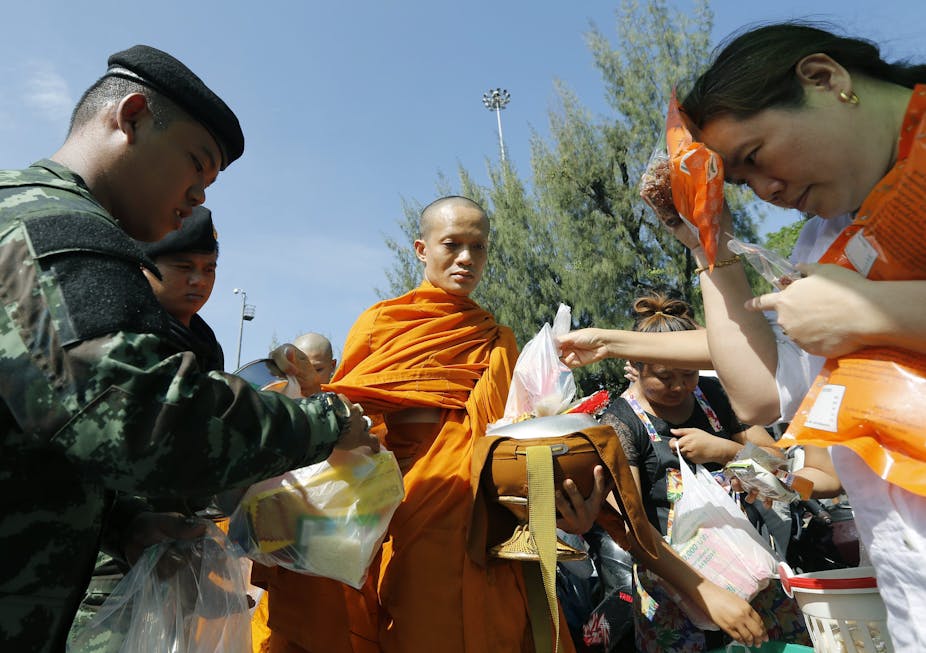Australia’s neighbourhood is currently a hotbed of fragility and conflict, with tensions in the South China Sea, a military coup in Thailand and civil rights abuses against Rohingya in Myanmar. But to navigate these conflicts and enhance regional security, the Australian government should invest more energy and resources in mediation and peacemaking.
Twelve of Australia’s 20 closest neighbours are classified as fragile states by the Organisation for Economic Co-operation and Development’s (OECD) Development Assistance Committee. Within Australia’s local Indo-Pacific region, fragile states include East Timor, the Solomon Islands, Kiribati, Tuvalu, Myanmar, Bangladesh and Sri Lanka.
Other regional disputes, such as those in West Papua and in the south of Thailand, are of concern despite not warranting inclusion on the OECD’s list.
The manner in which the government engages with the region’s conflicts and tensions is vitally important to Australia’s interests. The majority of modern conflicts are intrastate in nature – internal civil conflicts rather than war between states. While intrastate conflicts may often not be as visible and destructive as interstate wars, it is well recognised that the destabilising effects of civil war can reverberate across the region.
The use of mediation in international conflicts is not new. It was prescribed in the United Nations Charter as a tool for peacemaking, and its use and utility has steadily increased in the decades since. It is by no means a panacea for the world’s troubles, although its increasing adoption within the regular diplomatic operations of states and international organisations has helped to strengthen international norms on the validity of peaceful conflict resolution.
More than five times as many mediations took place in the 1990s as in the decade preceding. Small to middle-power states including Norway, Finland, Turkey and Qatar have realised the importance of investing in mediation. Consequently, they have begun to play an integral role in international peacemaking.
Closer to Australia, Malaysia has worked patiently and constructively with the Philippines and the Moro Islamic Liberation Front to construct a detailed and responsive peace plan for the Mindanao region.
Thirty-eight states are now members of the inter-governmental Group of Friends of Mediation. It includes many of Australia’s regional neighbours and allies – among them Bangladesh, Indonesia, Japan, Malaysia, Nepal and the Philippines. ASEAN is a member. That Australia is not a member of this important international forum highlights the low level of significance that Australian governments place on mediation.

Australia has, in the past, been actively involved in peacemaking. Between 1945 and 1999 Australia was involved in 11 mediation activities across six different conflicts. As UN General Assembly president in 1948 and 1949, H.V. Evatt was involved in peace processes in Kashmir and postwar Germany.
Former Labor foreign minister Gareth Evans was instrumental in resolving the decades-long civil conflict in Cambodia. He went on to head the International Crisis Group. Evans’ successor, Alexander Downer, played a role in supporting peace talks between the Papua New Guinean government and Bougainville separatists and was the UN envoy to Cyprus.
These Australian-led activities are juxtaposed with recent foreign policy that has centred on international peacekeeping and policing efforts. In the past decade Australia has been involved in large and costly military operations in the Solomon Islands, East Timor and Afghanistan, whereby Australia has intervened to provide security in states experiencing severe conflict.
This is not to question the value of these actions, but it does illustrate that Australia appears to be more willing to engage in reactive military intervention than to undertake proactive diplomatic peacemaking.
Understandably, the government supports regional peacemaking initiatives – both in principle and through foreign aid. Its support for improving education and strengthening government institutions in the Autonomous Region in Muslim Mindanao in the Philippines is one such example.

However, the government’s overall rhetoric is concerning. Peacemaking is absent from official discourse. As a consequence Australia is missing an opportunity to engage with its neighbours in pursuing opportunities to improve regional peace and stability.
Australia could, realistically, take a leading role in championing mediation in a number of conflict hotspots. For an Australian government looking to align itself more closely with the Asia-Pacific, mediation offers an opportunity to play a constructive role in shaping the security of the region for future decades.
A deliberate shift in foreign and aid policy is required to articulate that Australia seeks to actively pursue mediation and other peacemaking initiatives in working to resolve conflicts that plague Asia and the South Pacific. Such a recommendation has previously been made by the Parliamentary Joint Standing Committee on Foreign Affairs, Defence and Trade.
Australia has a dignified history in peacemaking. It would be wholly appropriate for the Abbott government to build upon these successes by establishing conflict resolution as a central foreign policy priority.

